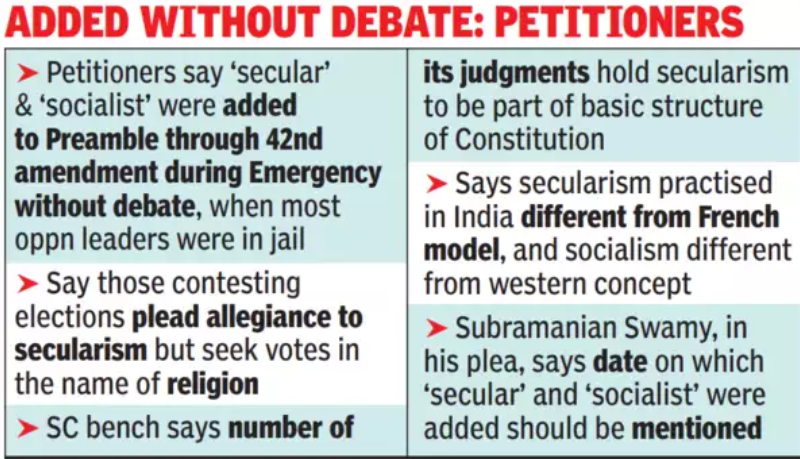Secularism is a core part of the Constitution: SC
(Source – The Hindu, International Edition – Page No. – 4)
| Topic: GS2 – Indian Polity – Indian constitution – Significant Provisions |
| Context |
| ● The Supreme Court reaffirmed that secularism is an integral part of the Basic Structure of the Indian Constitution while hearing petitions challenging the inclusion of “socialist” and “secular” in the Preamble.
● These terms were added through the 42nd Amendment during the Emergency in 1976. |

Secularism as Core Feature
- The Supreme Court reaffirmed that secularism is an essential and indelible part of the Basic Structure of the Indian Constitution.
- Justice Khanna highlighted that terms like “equality” and “fraternity” in the Constitution signal the importance of secularism.
Interpretation of Socialism
- The Supreme Court disagreed with the petitioners’ argument that “socialism” limits personal liberty and individualism.
- It clarified that the meaning of socialism in India differs from Western interpretations, focusing on equality of opportunity and equitable wealth distribution.
Challenge to 1976 Amendment
- A petitioner argued that while not against the terms “socialist” and “secular,” he opposed their retrospective insertion into the Preamble in 1976.
- The words were added through the 42nd Amendment during the Emergency, replacing “unity of the nation” with “unity and integrity.”
- The Kesavananda Bharati case established that the Preamble is part of the Constitution and can be amended, provided it does not alter the Basic Structure.
| 42nd Amendment |
| ● Added the words “Socialist”, “Secular”, and “Integrity” to the Preamble.
● Transferred subjects like Education, Forests, Weights & Measures, and Protection of Wild Animals and Birds from the State List to the Concurrent List. ● Restricted the power of judicial review, enhancing Parliament’s supremacy over laws. ● Extended the term of Lok Sabha and State Legislatures from 5 to 6 years. ● Introduced Fundamental Duties for citizens under Part IV-A of the Constitution. ● Gave primacy to Directive Principles over Fundamental Rights. ● Made the President bound by Cabinet advice. ● Amended Emergency provisions. |
| PYQ: How is the Indian concept of secularism different from the western model of secularism? Discuss. (150 words/10m) (UPSC CSE (M) GS-1 2018) |
| Practice Question: Discuss the significance of secularism as a core element of the Basic Structure of the Indian Constitution. How does the inclusion of the terms “socialist” and “secular” in the Preamble influence the interpretation of the Constitution? (250 Words /15 marks) |
